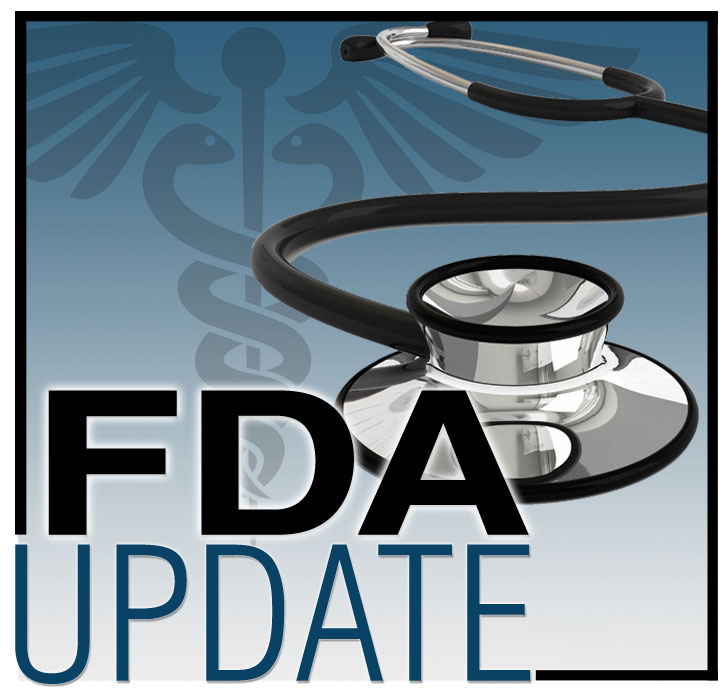
On April 28, 2017, the U.S. Food and Drug Administration (FDA) granted accelerated approval to brigatinib for the treatment of patients with metastatic anaplastic lymphoma kinase (ALK)-positive non-small cell lung cancer (NSCLC) who have progressed on or are intolerant to crizotinib.
Approval was based on a non-comparative, two-arm, open-label, multicenter clinical trial demonstrating a clinically meaningful and durable overall response rate (ORR) in patients with locally advanced or metastatic ALK-positive NSCLC who had progressed on crizotinib (the ALTA Trial; NCT02094573). All patients had tumors with a documented ALK rearrangement based on an FDA-approved test or a different test with adequate archival tissue to confirm ALK arrangement by the Vysis® ALK Break-Apart fluorescence in situ hybridization Probe Kit test. A total of 222 patients were randomized to brigatinib orally either 90 mg once daily (n = 112) or 180 mg once daily following a seven-day lead-in at 90 mg once daily (n = 110).
ORR was assessed by an independent review committee according to Response Evaluation Criteria in Solid Tumors (RECIST) 1.1. ORR was 48% (95% CI = 39%, 58%) in the 90 mg arm and 53% (95% CI = 43%, 62%) in the 180 mg arm. After a median duration of follow-up of eight months, median duration of response (DOR) was 13.8 months in both arms. In patients with measurable brain metastases at baseline, intracranial ORR was 42% (95% CI = 23%, 63%) in the 90 mg arm (n = 26) and 67% (95% CI = 41%, 87%) in the 180 mg arm ( n= 18). Median intracranial DOR was not estimable in the 90 mg arm and was 5.6 months in the 180 mg arm. Among patients who exhibited an intracranial response, 78% of patients in the 90 mg arm and 68% of patients in the 180 mg arm maintained an intracranial response for at least four months.
Safety was evaluated in 219 patients who received at least one dose of brigatinib in the ALTA trial. The most common adverse reactions, occurring in at least 25% of patients taking brigatinib, were nausea, diarrhea, fatigue, cough, and headache. The most common serious adverse reactions were pneumonia and interstitial lung disease/pneumonitis. Fatal adverse reactions occurred in 3.7% of patients and consisted of pneumonia (two patients) and sudden death, dyspnea, respiratory failure, pulmonary embolism, bacterial meningitis, and urosepsis (one patient each). Visual disturbances also occurred in patients receiving brigatinib. Adverse reactions leading to permanent discontinuation of brigatinib occurred in 2.8% and 8.2% of patients receiving 90 mg and 180 mg, respectively.
Patients receiving brigatinib should be monitored for new or worsening respiratory symptoms, hypertension, bradycardia, visual symptoms, and elevations in amylase, lipase, blood glucose, and creatine phosphokinase.
The recommended dosing regimen of brigatinib is 90 mg orally once daily for the first 7 days then, if tolerated, increase to 180 mg orally once daily.
Full prescribing information is available.
FDA previously granted brigatinib Breakthrough Therapy Designation for the treatment of patients with ALK-positive NSCLC whose tumors are resistant to crizotinib, as well as Orphan Drug Designation for the treatment of ALK+ NSCLC. FDA granted this application priority review. As a condition of the accelerated approval, the company is required to verify the clinical benefit of brigatinib in a confirmatory trial. A description of FDA expedited programs is in the Guidance for Industry: Expedited Programs for Serious Conditions-Drugs and Biologics.
Healthcare professionals should report all serious adverse events suspected to be associated with the use of any medicine and device to FDA’s MedWatch Reporting System by completing a form online, by faxing (1-800-FDA-0178) or mailing the postage-paid address form provided online, or by telephone (1-800-FDA-1088).
In collaboration with the FDA and as a service to our members, ONS provides updates on recent FDA approvals and other important FDA actions (e.g., updated safety information, new prescribing information) pertaining to therapies for patients with cancer. This allows the agency to inform oncologists and professionals in oncology-related fields in a timely manner. Included in the FDA updates is a link to the product label or to other sites for additional relevant clinical information. In supplying this information, ONS does not endorse any product or therapy and does not take any position on the safety or efficacy of the product or therapy described.





